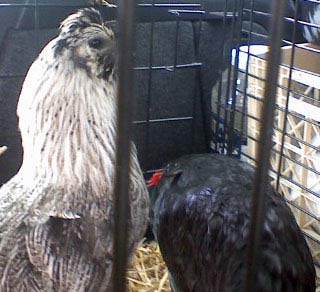Start Counting Your Chickens
Common Council likely to change chicken ordinance next week

Buffalo will join Rochester, Syracuse, Los Angeles, New York, and other major cities on Tuesday if an amendment is passed legalizing backyard chickens. The city ordinance was changed in 2004 to outlaw any fowl within the city limits as a response to an increase in cockfighting. But in doing so, Buffalo cut itself off from a growing movement of raising urban chickens as a way to stay connected to where one’s food comes from. “We’re behind the times actually when it comes to urban farming,” says Niagara Councilmember David Rivera. “I think this is a very progressive change.”
The fight for an ordinance change was ignited in April, when West Side resident Monique Watts was informed that the five hens she cared for in her Rhode Island Street backyard were illegal. Watts and her husband, Blair Woods, both founders of Urban Roots Community Garden Center, used the hens’ droppings for garden fertilizer and enjoyed the fresh eggs.
Watts is ecstatic that her chickens—which she moved to a secure location out of the city—may be returned to her soon. But before they come home to roost, she’ll have to go through the process outlined in the proposed amendment. Watts must pay a one-time $25 fee to the City Clerk’s office, then she must receive permission from any neighbor within 50 feet of her property line. Chicken owners must comply with other regulations, too: No more than five hens are allowed, food must be stored in rat-proof containers, and the chickens have to stay in a fenced-in area. Animal control officers will police homes where chickens are kept, and if anyone is not in compliance, the permit can be revoked and the chickens removed.
“The amendment is deliberately very restrictive,” Rivera says. “That separates the serious from the not-so-serious.” Watts feels the ordinance will be very “user-friendly” and hopes it encourages more chicken lovers to jump on board.
Rochester boasts about 50 members of its local urban chicken group and hosts an annual “coop walk,” where owners open up their backyards for people to walk through and see what they’ve done. A parallel fight to Buffalo’s happened in Madison, Wisconsin, in 2004. There had been a chicken underground in the city for many years, and when one long-time chicken owner, Alicia Rheal, got her chickens taken away, she fought the city to overturn the law. After a year of working with the city council, the law was changed and Madison became a big center for urban chickenry.
Out of that fight emerged Tashai Lovington, a local filmmaker who made a documentary about raising chickens in Madison. Her documentary, “Mad City Chickens, will be shown in 25 cities in three countries this summer. “The documentary has been shown in both cities where it’s legal and where it’s not legal,” Lovington says. “There’s a big interest in cities who want to get the laws changed. We’ve shown it for city council members to raise awareness.”
Diane Picard, executive director of the Massachusetts Avenue Project (MAP), has stated her support of the amendment, offering that MAP could host “Chicken 101” classes on how to get started. The education would work in conjunction with its Growing Green program, which teaches at-risk, inner city youth about urban agriculture. Picard, who has visited coops in Madison, Rochester and other locations, has seen the benefits of children witnessing where their food comes from.
The comprehensive amendment will be up for a vote at Tuesday’s Common Council meeting, but in a Legislative Committee meeting this week, nearly 50 residents showed their support. The few complaints and questions were addressed by Rivera, who has worked closely with Watts and other community members to form the conditions of the new law. Rivera expects the law to pass without opposition. “It’s good legislation,” he says. “It’s not high-profile, but it’s important to the quality of life of people in the city.”
—ellen przepasniak
blog comments powered by Disqus|
Issue Navigation> Issue Index > v8n27 (Week of Thursday, July 2nd, 2009) > The News, Briefly > Start Counting Your Chickens This Week's Issue • Artvoice Daily • Artvoice TV • Events Calendar • Classifieds |









 Current Issue
Current Issue